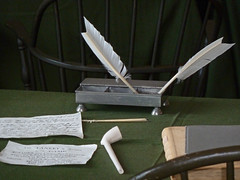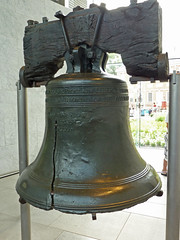 Joseph Adelman has a nice post on how he teaches the US Declaration of Independence in his early US survey — he reads it aloud; with the class standing, as in an 18th century church or town meeting — and I thought I might offer another perspective, since I use the same document in my World Since 1500 course.
Joseph Adelman has a nice post on how he teaches the US Declaration of Independence in his early US survey — he reads it aloud; with the class standing, as in an 18th century church or town meeting — and I thought I might offer another perspective, since I use the same document in my World Since 1500 course.
For the last few iterations of the course, I’ve had students’ primary source readings focus on the rising tradition of rights in Western, then World, civilization. So I have them read the US Declaration as part of a group, along with the English Bill Of Rights and the French Declaration Of Rights Of Man And Citizen. (Later in the semester, they read the UN’s Declaration of Universal Human Rights). This is in the context of a discussion of revolutionary change, following one on the Western Enlightenment.
When we talk about the Declaration, it serves as focal evidence for talking about the American Revolution, and I talk about historiography. (I talk about historiography a lot in World History, as it turns out, but my favorite bits are this one on the US Revolution and the Fall of Rome, where the historiography just layers and layers….) There are many ways to see the US Revolution — I’m increasingly fond of the “creole” generational theory, myself, as it helps situate it in the context of the Latin American revolutions, and connects it to post-colonialism, a little — and I point out that there’s evidence for most of them right in the text of the Declaration itself.
In particular, I raise the question of just how revolutionary the American Revolution was. The famous preamble is a classic statement of Enlightenment principles about humanity and government, which suggests the power of new ideas and real change. The body of the document, though, lists grievances based, in large part, on the earlier English Bill of Rights, and the structure of the whole Declaration follows closely on that example, which suggests less revolutionary aims and more an attempt to conserve rights already in existence against changing circumstances. And, of course, I have to talk about the Seven Years’ War, the tax and mercantilist policies which were driving much of the tension between the colonies and the Crown, and the extent to which many of Founding Fathers were involved in import and export related businesses.
 I point out that the “all men” of the Declaration was limited in effect, and that the attempt to preserve the self-governance of the colonies against royal interference largely succeeded in the short term, as the states continued to govern themselves and only slowly to create coordinated or national policies. In this it was also conservative, rather than liberalizing. But the Constitution, when it came to be, embodied Montesquieu’s tripartite scheme, which is clearly foreshadowed in the complaints of the Declaration, and maintained an elected executive and legislature, a political experiment of the most ambitious sort. Well, ambitious if you discount the even more radical political experiments of the French, which began at that very moment, and the example of which helped to solidify some of the more conservative elements of American leadership.
I point out that the “all men” of the Declaration was limited in effect, and that the attempt to preserve the self-governance of the colonies against royal interference largely succeeded in the short term, as the states continued to govern themselves and only slowly to create coordinated or national policies. In this it was also conservative, rather than liberalizing. But the Constitution, when it came to be, embodied Montesquieu’s tripartite scheme, which is clearly foreshadowed in the complaints of the Declaration, and maintained an elected executive and legislature, a political experiment of the most ambitious sort. Well, ambitious if you discount the even more radical political experiments of the French, which began at that very moment, and the example of which helped to solidify some of the more conservative elements of American leadership.
I have little patience for those who would fetishize the Founding Fathers and the Constitution as written, turn them into an icon of secular faith in American Exceptionalism. But I’m always impressed, as I work through this material, with the way in which the intellectual and political resources of the moment were marshalled into the Declaration, and the tensions of the moment were balanced into an effective and productive evolving Constitutional system. But clearly my presentation cuts against the grain of American exceptionalism: the American Revolution shows clear evidence of Enlightenment thought, English civic tradition, post-colonial pride, economic competition, and a desire for social stability which meant that very little changed in most people’s lives as a result.

